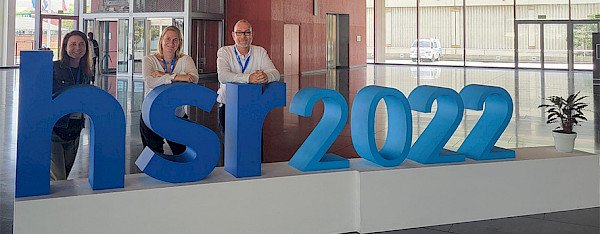Unpacking from the Health Systems Research Symposium (HSR 2022) – Bogotá, Colombia
At the end of October this year, hera’s Director Marieke Devillé, CEO Leen Jille and Project Officer Alice Peschiutta made the trip to attend HSR2022 in Bogota, Colombia. By all accounts it was an engaging experience and a positive immersion in health systems research. According to Leen, “It was also a unique opportunity to step away from the day-to-day work of hera’s projects and to reflect on our work, emerging themes and the methods we deploy to produce and synthesize evidence”. There were many wonderful face-to-face connections, some long overdue after several years of online meetings, making it altogether a rewarding experience. The theme this year was Health Systems Performance in the Political Agenda: Sharing Lessons for Current and Future Global Challenges. Cross-sectoral responses, intersectional analysis of power and equity, pandemic preparedness, universal health coverage, Covid-19, system resilience and political accountability are just some of the underpinning conversations that Marieke and Leen noted on their return.
A symposium highlight for the hera team was the capacity-building session on Gender equality mainstreaming in research and evaluation, presented by Marieke along with hera consultant Alejandra Martinez. In the session, participants were invited to apply a gender lens to three health system components: health financing, supply chain and health governance and decision-making. One of the interesting outcomes of the session, according to Marieke, is that many people know about the concept of gender mainstreaming but don’t know how to apply it. In the practical session participants engaged with the content and agreed that when focused it is actually very easy to apply a gender lens to the work. Participants were then invited to apply a gender lens to a fictitious request for proposals (RFP) and asked to develop strategies for making it more gender-responsive. Generally, participants reported finding this a beneficial exercise and having such a hands-on and practical approach was highly appreciated by the attendees.
Another highlight for the hera team was seeing the new Health System Global (HSG) strategy unveiled at the HSG General Member Session. A hera team led by Leen and hera Associate Giorgia Lattanzi supported the development of the Strategic plan covering 2022-2026 with the goal of positioning HSG at “the forefront of health systems policy and research within the changing landscape of global health.” HSG is the parent organisation of the HSR symposium, so it was nice to be there and to talk face-to-face to many of the (Board) members. The new strategy is available here.
A number of presentations looked at how the most vulnerable were most affected during the Covid-19 pandemic. Throughout many presentations, the issue of equity was grappled with. At times it seemed to Marieke that many of the discussions around equity were often conflated with reaching the most vulnerable populations. However very often there was no explicit discussion about who the people are and what intersectional groups they might belong to. Power was similarly a key concept during the conference and something that was addressed in many sessions. A participatory session on “you want to deal with power, while riding on power”, facilitated by the ARISE project encouraged the audience to look at how different types and forms of power affect participatory research for action. The results from their work are published here. Power was certainly a central subject in the session attended by Leen on rethinking donor transition and external assistance for health
The session on learning health systems facilitated by the Alliance on Health Systems Policy and Research considered what we have learned so far and how we look at it from an investors perspective. Panellists all had their own perspectives on what type of learning is important for health systems, from impact evaluations, participatory methods, using routine data, embedded research, etc. It provided valuable insights not only regarding methods applied but also the need to retrospectively document lessons learned, which hera applies in most of its assignments.
There is much more unpacking of the sessions and conversations that were experienced but that will be for another time. For now, we turn to integrating the lessons learned and continuing the work. Gratitude to the hosts and conference organisers.

